Stephen Sondheim Sweeny Todd Interview
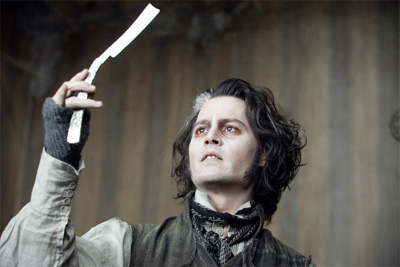
Stephen Sondheim Sweeny Todd Interview
A RARE AUDIENCE WITH STEPHEN SONDHEIMBy Paul Fischer in London.
Stephen Sondheim rarely talks to the press and why should he? As one of the most acclaimed lyricists and composers of American musical theatre since the days of Rogers and Hammerstein, Sondheim is an American institution. From early classics where he provided the lyrics to West Side Story and Gypsy, to A Funny Thing Happened on the Way to the Forum, on which he wrote both music and lyrics, Sondheim has crafted enduring works including the likes of A Little Night Music, Company, Follies, 1979's Sweeney Todd, Merrily we Roll Along, Sunday in the Park with George and Into the Woods. At long last his Sweeney Todd has been turned into an audacious movie musical underb the direction of an innovative Tim Burton and starring Johnny Depp in the title role. The film has been given the maestro's stamp of approval which explained his presence at a media conference held in London, which revealed a relaxed, funny and fascinating man.
PAUL FISCHER was there and asked the first question.
Paul Fisher Why did it take this long for this particular work of yours to make it to the screen, and how reticent were you to finally give up the rights to this?
ACTOR: I was never reticent. Just, nobody asked to do it. That's all. I have no idea. You know, movie musicals have not been very popular up until very recently, when a couple of them have suddenly broken through, like Chicago. But, you know, over the last 20 years, movie musicals have not been in great demand. So I think it never occurred to anybody. And Sweeney was not the kind of big hit that made movie studios clamor for it, you know? It lost all its money on Broadway-not all, it lost half its investment-and it's only over a period of time that it has become sort of more popular and more done, with revivals and things like that.
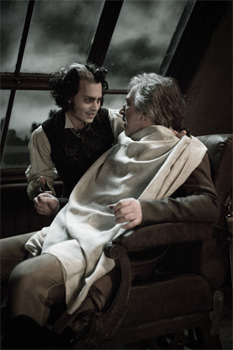 As you probably know, it was a big flop in London. In London, critics hated it, which was ironic, because it was sort of my love letter to England. I'm serious. I've always been an Anglophile, and they didn't like it, so, I think it's the combination of those things. The first person that asked to do it was in fact Tim, about 20 years ago. He came to see me and said he wanted to do it as a movie musical. I said, Wonderful, and that was the end of that. We had a nice conversation and I never heard from him again. He got involved in other projects. And then a few years ago, during the production, Sam Mendes did a production of Gypsy in New York City, and we were having coffee during the recording session and Sam said, have you ever thought of Sweeney Todd as a movie. And I said, Well, Tim Burton once came to me but otherwise nobody has ever approached me about it. He said, I'd like to do it. I said, great, let's do it. And he got hold of John Logan, the screenwriter, and they started to work it out together. And then Sam got frustrated by casting. The people he wanted to cast, for one reason or another, didn't come through. So after a couple of years, Sam said I give up. Then, I don't know whether, I don't actually know exactly who it was who brought it to Tim and said, Are you still interested? Tim obviously said yes, and that's what happened.
As you probably know, it was a big flop in London. In London, critics hated it, which was ironic, because it was sort of my love letter to England. I'm serious. I've always been an Anglophile, and they didn't like it, so, I think it's the combination of those things. The first person that asked to do it was in fact Tim, about 20 years ago. He came to see me and said he wanted to do it as a movie musical. I said, Wonderful, and that was the end of that. We had a nice conversation and I never heard from him again. He got involved in other projects. And then a few years ago, during the production, Sam Mendes did a production of Gypsy in New York City, and we were having coffee during the recording session and Sam said, have you ever thought of Sweeney Todd as a movie. And I said, Well, Tim Burton once came to me but otherwise nobody has ever approached me about it. He said, I'd like to do it. I said, great, let's do it. And he got hold of John Logan, the screenwriter, and they started to work it out together. And then Sam got frustrated by casting. The people he wanted to cast, for one reason or another, didn't come through. So after a couple of years, Sam said I give up. Then, I don't know whether, I don't actually know exactly who it was who brought it to Tim and said, Are you still interested? Tim obviously said yes, and that's what happened. So the bulk of the time was merely that people weren't doing movie musicals. And the few movie musicals they did do were big smash hits. And Sweeney was not one of those. So nobody approached me except as I say, Tim. And then Sam did about , what four or five years ago. So that's what happened.
Paul Fisher You say this kind of movie version of this kind of musical is not very popular, but there must be so many directors who was to direct you on Broadway version. What do you normally look for in terms of the directors?
ACTOR: I wish I could answer that, except that nobody did ask. I haven't been in the position of picking and choosing, ad choosing qualities. It's just, you know, obviously if a director approached me to do a show, as a movie, and it was director whose movie I didn't like, I would say no. But that has not arisen because not very many directors have asked.
Paul Fisher And talking about Tim, what movie did he do that made you think, OK, I can make my baby with him?
ACTOR: The answer will surprise you, it's because he loves the material. I knew it from the time he came to me 20 years ago, that he really loved the story, and he likes the musical. And he's not a particular fan of stage musicals, but something about this spoke to him, and I absolutely trusted that. He didn't have to be persuaded about the story, the story, which he didn't want to change. He wanted the story just the way it was. All the changes that did occur have to do with small changes within the story. But he didn't want to change the story, he didn't want to change the ending, he didn't want to change anything about the telling of the tale. That's enough. I was also enthusiastic about some of his movies, but the real point was that he loved the material.
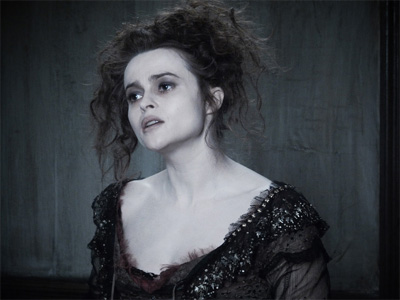 Paul Fisher Can you talk a little bit about the elements or moments that are in the film that could never have been on stage?
Paul Fisher Can you talk a little bit about the elements or moments that are in the film that could never have been on stage? ACTOR: I'm trying to think about what they would be. The thing about the stage is that you can virtually do everything on the stage that you can do on movies, it just depends on the audience's imagination. You can go from the Tokyo airport to a hospital interior on the stage, just as quickly as you can with a cut in a movie. Just, you don't bring in tons of scenery, but you do it through suggestion. So, offhand I can't think of anything that couldn't have been done on the stage, the way it's done in the movie, except for things like the blood-the amount of blood. Although the blood on the stage shocked the audience. It was compared to what's on the screen, it's not much, but the way that it was used, and the fact that it was there.
When Sweeney slits all the throats of the people, in the second act, when he's singing the ballad to Joanna and he's cutting throats, I used to walk down the side aisles of the theater. Now, you know, it was a razor this size with a little blood thing in it, and a little spout, but it was their imagination that made it just as big as the blood on the screen. But you have to have more blood on the screen, because the screen is not about the imagination. The screen is reportorial; The screen is newspaper photography. Doesn't matter whether it's a fantasy or not, you are looking at reality, and real people and therefore it's gotta, you have to have more blood. But the amount of blood on the stage was the same, and the effect of the blood, as the movie. And in fact in John Doyle's recent production, there was no blood on the people themselves. Just people poured buckets of blood into another bucket of blood. And the audience still had the same illusion. And when he finally got to the judge, there were merely more buckets of blood. And so it amounted to exactly the same thing, as when Sweeney kills the judge on the screen. So offhand, I can't think of anything that's in the movie that couldn't have been done or wasn't done on the stage.
Paul Fisher Along that same line, was there anything that was a surprise to you?
ACTOR: Yeah. The middle of the epiphany, when he cuts away into the street and he's threatening everybody in the world. That was a surprise, and I thought that was brilliant. What we did on the stage, the equivalent of that was, there was a section of the stage and I had Todd literally threaten the audience. He was threatening, and he suddenly jumped down and he was as close to the audience as I am to you right here. People who had the misfortune of getting those seats. I thought if there is anybody really elderly, we are really in trouble, because Len Cariou knew how to play murderous anger. This guy who played Sweeney originally. And when he came down and said, You sir? It was a sort of break the fourth wall and leap over the stage, because it was that close. This little part of the stage was built out to this section of the audience. On stage right. And it was just as scary. But, what Tim did in the movie is something you can't do on the stage.
Paul Fisher You mentioned earlier being an Anglophile for a long time, and I wonder if you could elaborate on that, that passion for English culture. And then also the usefulness of the city of London as a character in and of itself?
ACTOR: Well, the city of London, that really comes from Chris Bond's play, which is actually partly about the class system. The interesting thing about Bond's play is that all the upper class characters speak in a kind of blank verse. It's almost iambic pentameter. All the lower class characters speak in demotic English. The city of London, therefore, is a character split between those above and those below, as the lyric says. First part of the question was about the passion for the English.
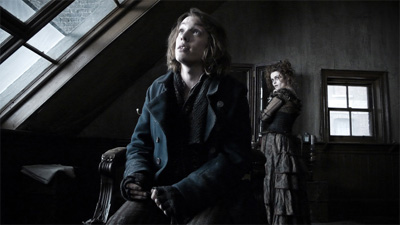 That started with my love of crossword puzzles. One of my collaborators is a man named Burt Shevelove, who was also an Anglophile, he wrote A Funny Thing Happened on the Way to the Forum. And in fact with the money he made from Forum he moved immediately to London and he lived here for the rest of his life. He introduced me to the puzzles in the Listener, the old Listener. And I became fascinated, because I love puzzles, and I love cryptic puzzles. They did not exist in the United States. Those of you who do British puzzles, they never existed in the United States, until I'm happy to say, I wrote them for New York magazine, and now they're very popular here. But the Listener puzzles I like because they were gimmicky, and I like the Ximenes puzzles in the Observer. And I have been a subscriber to the Observer ever since, because even though Ximenese died, I've gotten in the habit. So I have been au courant I guess with what goes on in popular culture, and theatrical culture, and what goes on in England, since I was 28 years old, 27 years old, which is the first time I actually came to London and just loved it.
That started with my love of crossword puzzles. One of my collaborators is a man named Burt Shevelove, who was also an Anglophile, he wrote A Funny Thing Happened on the Way to the Forum. And in fact with the money he made from Forum he moved immediately to London and he lived here for the rest of his life. He introduced me to the puzzles in the Listener, the old Listener. And I became fascinated, because I love puzzles, and I love cryptic puzzles. They did not exist in the United States. Those of you who do British puzzles, they never existed in the United States, until I'm happy to say, I wrote them for New York magazine, and now they're very popular here. But the Listener puzzles I like because they were gimmicky, and I like the Ximenes puzzles in the Observer. And I have been a subscriber to the Observer ever since, because even though Ximenese died, I've gotten in the habit. So I have been au courant I guess with what goes on in popular culture, and theatrical culture, and what goes on in England, since I was 28 years old, 27 years old, which is the first time I actually came to London and just loved it. So I'm afraid the Anglophilia has no deeper routed than the Ximenese crossword puzzles and the Listener crossword puzzles. So I got habituated, and the first time-actually, the first time I came to London I was 22, but that was sort of passing through. The first time I stayed in London, it was when West Side Story was done here. I don't think I've had a year since when I haven't been here at least once.
Paul Fisher Can you tell us what you thought of the film, having seen it, and secondly, did it suffer at all from not having professional singers in the main roles?
ACTOR: No. First of all, I found the film stunning and was quite surprised by how stunned I was, even though I knew what was going to be done. Because I was not around during the actual filming of it. I was only here for the recording sessions. And so outside of seeing sort of rushes, which I had seen a lot of , I had never seen sequences put together. Since I received the rushes on a computer, and they were often slow, that sort of thing, I didn't see all the rushes, because it was no fun. So in that sense, the film was a kind of fresh experience for me. I must say I was knocked out by it. I was surprised also by how knocked out. I was knocked out by how knocked out I was.
And so that's the first thing. I've always preferred actors who sing to singers who act. All the shows I've ever done, and which I get some flak for and some resistance from colleagues for, because I'm interested in storytelling. What I like about songwriting is songs used to tell a story. That's why I don't write songs apart from theatrical pieces. I'm not interested in writing songs qua songs, I like songs that are part of a dramatic texture. Therefore I like the scenes to be active. I want to follow the story, and that means you lean on the actors. So I'm used to what I would call untrained singing. And if there had been anybody in the film, anybody in the leading roles had been cast with a professional, capital S singer, then I think it would have been out of balance and it wouldn't have worked so well.
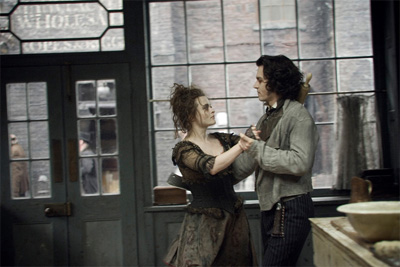 But they're all really actors who are musical, all of them, with the exception of Lauren Michel, who has had a career on the stage here as a singer. And but even she tamped down her voice, and she has very little to sing in the movie. But if she had had any big aria, then it would have required that everybody else either come up to her or go down in terms of the quality of the singing, of the professionality, of the sheen. You can tell a professional singer from a nonprofessional singer. So they're all of a quality, and that's why I think it works so well.
But they're all really actors who are musical, all of them, with the exception of Lauren Michel, who has had a career on the stage here as a singer. And but even she tamped down her voice, and she has very little to sing in the movie. But if she had had any big aria, then it would have required that everybody else either come up to her or go down in terms of the quality of the singing, of the professionality, of the sheen. You can tell a professional singer from a nonprofessional singer. So they're all of a quality, and that's why I think it works so well. Paul Fisher The original score for Sweeney Todd is through composed, which means there's no break. Did you have to make adaptations to the score for the film?
ACTOR: Yes, adaptations in terms of cutting certain sections of songs out. Where there wasn't anything active to film. The trouble with most musicals that have been done for the screen, in fact, all the musicals that have been made from stage musicals, is that they are essentially films of the stage musicals. And the songs are used as songs. What Tim wanted and Logan and I also, was that if a song does not lend itself-on stage, you can sit and listen to a song being sung for three, four, five minutes, because that's the convention, and you can enjoy it because it's taking a moment and expanding it, or as Burt Shevelove said, savoring the moment. But on the screen, at least I as a movie fan, I want the story to be told and I want it to go swiftly. So that meant that we had to excise certain parts of the songs and excise certain songs.
So I would look towards, if Tim or Logan said to me, can we get from this point to that point more quickly, I would find a way of compressing, or omitting, or eliding. So that it would still maintain the shape of a song. Of the song, without having to-I can give you numerous examples. There's a whole middle section of "Green Finch and Linnet Bird", which is cut, there's a whole middle section of "Little Priest" which is cut. But unless you know the score, you wouldn't know it, I think. I like to think you wouldn't know that anything was cut. I might be wrong, but I think you wouldn't know. And I bet a lot of people who only know the score superficially will not notice those elisions. But those are the things I worked out, so the movie could be told as you all saw, swiftly. You know, it's an hour and 45 minutes long, probably, and it tells a moderately rich story. In that time. And yet, people sing, which is - when you sing, it takes longer than when you speak. Yet for my money, it does not seem attenuated. It does not seem like it's a taffy pull.
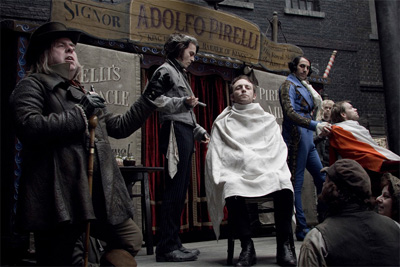 Paul Fisher The actors have said that they were rather stressed out, having to sing in front of you. Did you relish your power in front of them, or did you do anything to make them feel more comfortable?
Paul Fisher The actors have said that they were rather stressed out, having to sing in front of you. Did you relish your power in front of them, or did you do anything to make them feel more comfortable?ACTOR: No. I spent my entire life relaxing actors and saying, please. I'm by nature generous. I hate the idea that people feel like they're auditioning. And all I'm there to do is to help them feel confident. The whole idea of dealing with people who have not sung professionally before is giving them the confidence to sing. It's as simple as that. And as hard as that. To give somebody confidence. They have confidence in acting, but they have very little confidence, or no confidence, in singing. And the only way you can support that is to help them and just rehearse them and gently, so. So I get no pleasure whatsoever out of their discomfort.
Paul Fisher Were you temped to write a bunch of new songs so that you could be nominated for an Oscar?
ACTOR: No!
Paul Fisher Were you given pressure to do that by the producers?
ACTOR: No, no. We don't think that way, no.
Paul Fisher As a composer, looking at this movie afresh, how has your style changed through the years?
ACTOR: Well, I change my style with every show. I'm, you know, there are foxes and hedgehogs. I'm a fox. I don't dig one place deep, I scour the field. And the style for Sweeney Todd is entirely different than for any other show I've written. I would claim that that was true of each show I've written. I'm a firm believer in content dictating form and style. And, you know, if you're going to write Company , then you're going to write that kind of score. If you're going to write Pacific Overtures, then you write that kind of score. And if you're going to write Sweeney Todd you write that kind of score. So there are other composers who would use same style for each. It's neither good nor bad, it's who you are as a composer. I'm an eclectic, and I always have been.
Paul Fisher Are you working on anything at the moment?
ACTOR: Our final rewrite of the show formerly known as Wise Guys, also known as Bounce. We'll do that in the fall at the Public Theater. Meanwhile I'm nibbling at a couple of things with John Weidman and James Lapine. And writing a book.
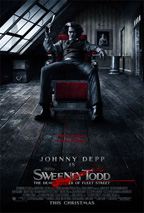
Sweeny Todd
Starring: Johnny Depp, Helena Bonham-Carter, Alan Rickman, Timothy Spall, Jamie Campbell Bower, Jayne Wisener, Sacha Baron CohenDirector: Tim Burton
Rated: MA+
Genre: Musical & Performing Arts
Runtime: 1 hr 57 mins
With its rivers of blood, this adaptation of the Stephen Sondheim musical isn't for the faint of heart--or stomach. But thanks to the black humor, impeccable production design, and gorgeous music, Tim Burton fans will want to sing after seeing SWEENEY TODD.
MORE
- Viggo Mortensen The Road
- 24 Cast Reunion
- Aaron Eckhardt No Reservations
- Aaron Eckhart The Dark Knight
- Adam McKay Step Brothers Interview
- Alan Alda Diminished Capacity Interview
- Alan Alda Diminished Capacity Interview
- Alex Dimitriades
- Al Pacino Oceans 13
- Alan Rickman Snow Cake
- Alan Rickman Sweeney Todd



